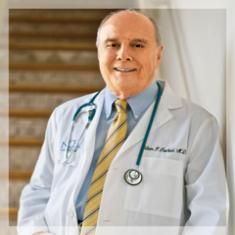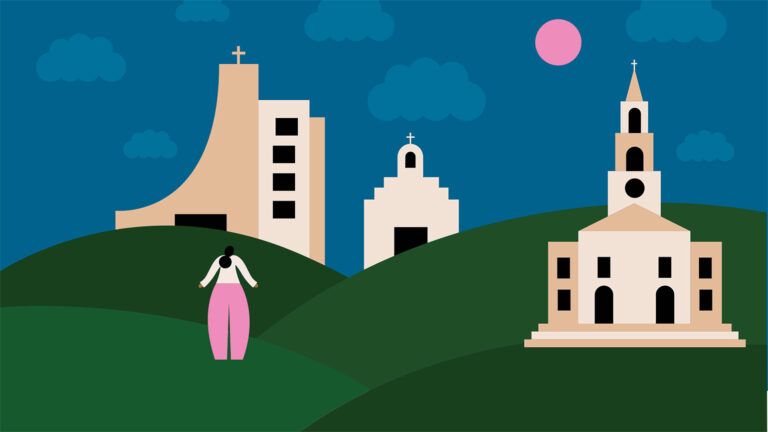Retirement. Lingering with the paper over a late breakfast. Basking in the sun, legs dangling in the pool. Nothing but blue skies and open fairways.
My wife, Nancy, and I dreamed of this day after running my dermatology practice for 40 years. Now, a week into the promised land of retirement, I was haunted by work still left undone.
“Forget the golf game or sleeping in late,” I told Nancy. “I just can’t all of a sudden stop being a doctor.”
Yet, we’d closed our practice, our friends had given us a party, we had stacks of brochures of trips we could now take.
Instead, I kept thinking about a patient we’d treated, a restaurant worker who washed dishes and never made much more than minimum wage. She came in with a bad case of dermatitis that had left her hands red, inflamed and very sore. More troubling was the melanoma on her shoulder. “We’ll have to treat that too,” I told her.
“But, doctor,” the woman had said, “I don’t have insurance.”
“Don’t worry,” I told her. “Just pay what you can.” We could absorb the rest, and did.
Now, though, I couldn’t get her and many others in our community like her out of my mind. Caregivers, construction workers, cleaners, gardeners, babysitters, they worked long hours for little money and no medical insurance. I hated to think of how many of them put off seeking medical care because they couldn’t afford it or were afraid of being turned away. Medicine had given me a wonderful career—it was my calling. Nancy’s too. She was a nurse. Was God calling us in a new way?
That night at our kitchen table, Nancy and I talked about starting a clinic for the working poor. Nancy took notes on a legal pad and we kept coming up with ideas.
The clinic would be staffed almost entirely with volunteers. Patients would be treated with dignity and respect. They would be able to get all their medications right on site for minimal—if any—cost. We would be open in the evenings and on Saturdays for patients who couldn’t miss work. And no one would be expected to pay more than one hour’s wage.
We got so excited we couldn’t stop talking—I hadn’t pulled an all-nighter like that since med school. The last thing we did was say a prayer: “Lord, if this clinic is really meant to be, you’re going to have to give us a hand.” Our dream was going to take a lot of groundwork to happen.
A couple of nights later we gathered a group of 14 friends in our living room—doctors, nurses, social workers, an attorney, a pharmacist, a CPA, many of the same people who had toasted our “retirement” only a few weeks earlier.
Nancy served wine and cheese and I outlined our vision for the clinic. “These are people who often fall through the cracks,” I said. “They don’t qualify for government aid and they can’t afford existing clinics. We would have to do this with donations and grants…and plenty of volunteers.” I looked around the room. “We need help from each and every one of you to make this happen. How many of you are in?”
All 14 hands shot up.
We divvied up the tasks. One drew up a business plan. Another gathered the necessary paperwork to start a 501(c)(3) charity and get approval to open a clinic. The pharmacist worked his contacts with the drug companies for donations and more reductions. I took charge of finding us space.
Hat in hand, I visited the CEO of Naples Community Hospital. This was a new role for me—begging.
“We have virtually no money and we need an office for this clinic….” Maybe he saw the urgency in my eyes. He leaned across his desk and offered two storefronts in a mall owned by the hospital.
“They’re not in the greatest shape, but they’re just standing there empty. We could rent them to you…” For the first of many times I said a quick prayer about money. “…For a dollar a year.”
“I think we can manage that,” I said with a smile, and pumped his hand.
The CEO wasn’t kidding about the space. I parked in an all-but-abandoned strip mall in a funky part of town.
I stepped gingerly through the doorway. What a mess! Dust and debris everywhere. Punched-in walls. A few doors down was a fish restaurant. Its odor wafted through the door. How would this ever turn into a clean, welcoming clinic?
“Maybe we bit off more than we can chew,” I told Nancy that night.
“Remember, we’re not in this alone,” she said.
The next time I went back to the space I took some brooms and garbage bags. I’d given an interview to the local paper, outlining our ideas and our need for volunteers: “doctors, nurses, social workers.” I should have asked for people to sweep the floor, I thought. I gathered up a bundle of trash, trying to remember the excitement Nancy and I had felt as we dreamt up our project. I never expected to be standing in dust, breathing in the sour stench of fish.
There was a knock at the door. In walked a man in a suit. “I’m looking for Dr. Lascheid,” he said.
“That’s me,” I said.
“I’m Dr. Bill Cribbs,” he said. “I read the article in the paper. I’d like to help out.”
“As you can see,” I said, “we’re not quite ready for business.”
The doctor took off his suitcoat. “Give me a broom,” he said. “We have to start somewhere.”
And so we did.
We opened the Neighborhood Health Clinic in Naples, Florida, in April 1999 with a small staff of nine volunteers: three physicians, three nurses and three office workers.
Eight patients showed up that very first day. One man needed only a simple brace for his leg, but I’m sure he would have jumped up and down with joy if he could. “God bless you,” he kept saying. He reminded me of why I had gone into medicine in the first place. To freely share the gifts I had been given.
The clinic has grown so much that now we have hundreds of volunteers and a large airy space of our own. In a decade we’ve treated more than 40,000 cases and provided more than twenty million dollars in free care to those in need.
Every time we hit a roadblock—the need for new equipment, new computers, bigger space—there has always been some solution that has appeared, just like that doctor who picked up the broom.
Nancy and I have finally stepped back from the day-to-day operations, but you can’t keep me away. I love the place, the kindness of all the volunteers, the gratitude of the patients, the positive energy of people being healed.
Nancy and I had dreamed of retirement. We just had no idea how big—and how good—the Lord would make that dream.






